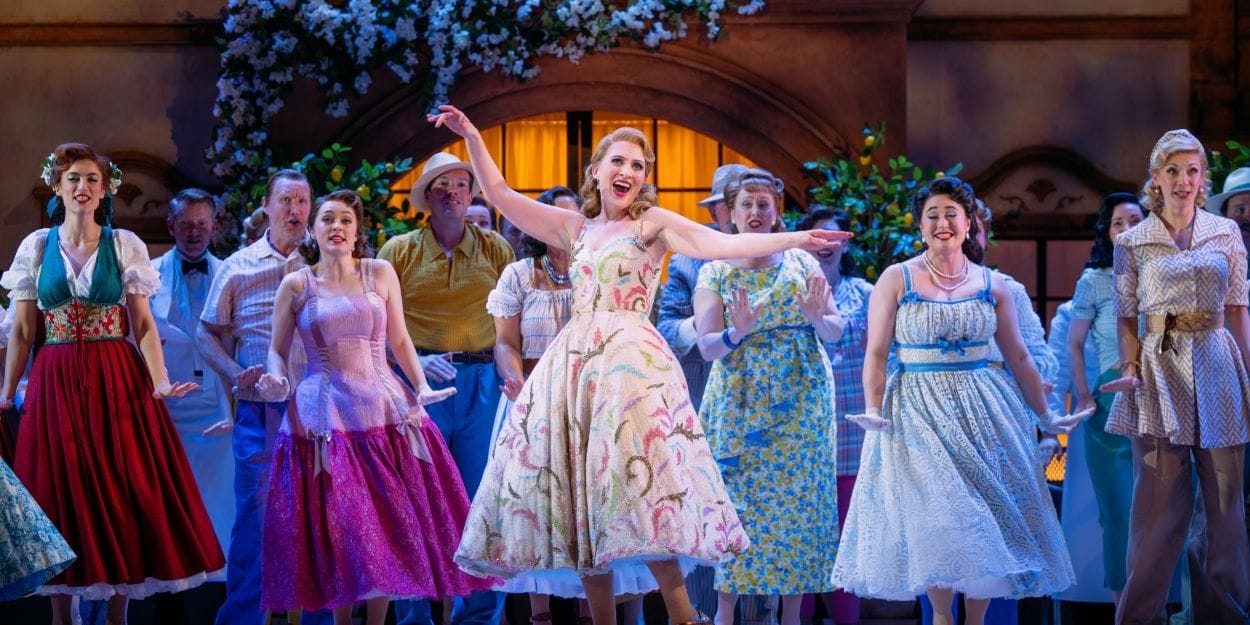
It’s been a while: well, over 40 years, since I heard Lehár’s Die lustige Witwe, in an amdram production just outside of Manchester in which I was playing French horn. Has absence made the heart grow fonder?
Well, there is no doubting that having the orchestra of Scottish Opera helps. Under Stuart Stratford (who has conducted some notable productions at Opera Holland Park previously), the band played beautifully, strings demonstrating real body, wind characterful, brass accurate. The Overture was heard in an arrangement by Douglas Gamley, an old hand in this field; Derek Clark created the orchestral reduction for the evening. The cast was excellent. The performance was heard in a ‘New English Version” (less of a translation, the book by John Savournin and lyrics by David Eaton are more of a free adaptation). The impression though is that for all of the fine tunes, the piece feels rather long for its materials.
The production is a three-way split between OHP, Scottish Opera (hence the presence of their orchestra) and D’Oyly Carte Opera. Director John Savournin sets the opera in the mafia era, changing some character names; the contrasting setting is a lemon grove in Sicily (the two bound together visually by the good old trope of a birthday cement mixer). Revolving sets by takis enable smooth transitions, be it a New York apartment, a Sicilian lemon grove or Maxim’s Club (Manhattan),and lighting director Ben Pickersgill is on point. So, what could go wrong?
Fans of Goodfellas or The Sopranos will find plenty to enjoy, including camped-up gangster accents. And so will fans of English farce, the other reference point here, surely, including the odd Carry On/Viz-type line (‘I’ll take you up the Louvre’). Jokes there are galore, and puns (Hanna Glawari/Calamari plus other rhyming malapropisms) but there seemed only the odd titter from the sold-out audience.
We begin in a penthouse, guests to head honcho/Godfather Don Zeto’s birthday; a cityscape is visible through the windows. In this context, Lehár’s music could well be a Hollywood score.
But pasted-on New York criminal underworld accents do jar after a while, and Lehár does, let’s face it, give us “a while’. This is not short score, and for all of the orchestra’s many felicities, here was a bit of a feeling that if Wagner wrote an operetta set in New York, this might be it. Effective evening lighting is impressive for a short while, but it is what it contains that counts. It was left to all of those good tunes (the ‘Vilja-Lied is up there with the very best, after all) to save theday, and to some extent they did. Lehár is nothing if not a genius of melody.
With everything in place in the pit, it was up to the singe-actors to ensure Lehár’s score succeeded. The bass-baritone Henry Waddingon was superb as both actor and singer as ‘Don Zeta,’ our patriarch; Rhian Lois played his wife, Valentina, a sort of Mailyn Monoe-lookalike was full of life, her voice a delight (she has proved herself many a time, including as Papagena a Covent Garden and at ENO).

Tennesee-born Paula Sides made a terrific OHP debut as Hanna Glawari, her Vilja-Lied sophisticated and soaring and, with the help of the orchestra and Stratford, filled with the ambience of, erm, Old Vienna; some might remember Sides singing the title role of Massenet’s Thaïs for Chelsea Opera Group, or as The Queen of Shamakha Rimsky Golden Cockerel for ETO). Her Danilo was Alex Otterburn who, along with Waddington, dominated the male voices (Otterburn was previously an Emerging Artist for Scottish Opera and an ENO Harewood Artist). Other stand-outs in a strong cast were William Morgan’s confident Camille de Rousillon, Ellie Neate’s faultless Sylvia (Neate had previously impressed as Laurette in Bizet’s Le docteur Miracle and as Lucy England in Menotti’s The Telephone at Guildhall) , Scottish baritone Jonathan Forbes Kennedy’s strong Mr Bodganovitch, and a fine ‘Sam Brioschi’ from Connor James Smith. The chorus was exceptional.
But for all of this musical excellence, the production just tried too hard. The archetypal mafioso relocation is of course, Jonathan Miller’s Rigoletto for ENO. It is durable because it just works; I am not sure I can say the same about this Lehár, unfortunately. Did absence mak the heart grow fonder, then? Perhaps not.
Die lustige Witwe (sung in English as ‘The Merry Widow’)
Music composed by Franz Lehár
Libretto: Vicor Léon and Leo Stein; New English version by John Savournin (book) and David Eaton (lyrics)
Orchestral reduction by Derek Clark; Overture arr. Gamley.
Cast and production staff:
Hanna Glawari – Paula Side; Danilo – Alex Oterburn; Don Zeta – Henry Waddington; Valenina – Rhian Lois; Camille de Rossillon – William Morgan; Nicky Negus – Mattew Kellet; Carmelo Cascada – Chrisopher Naime; Sam Brioschi – Connor James Smith; Mr Bogdanovitch – Jonathan Forbes Kennedy; Sylvia – Ellie Neate; Mr Pritschisch – Francis Church; Paulina – Rosie Lavery; Mr Kromow – Matthew Siveter; Olga – Amy J Peyne
Diector – John Savournin; Designer – takis; Lighting Director – Ben Pickergill; Choreographer – Kelly Lloyd-Jones
Chorus; The Orchestra of Scottish Opera / Stuart Stratford
Opera Holland Park, Kensington, London. 19 June, 2025










